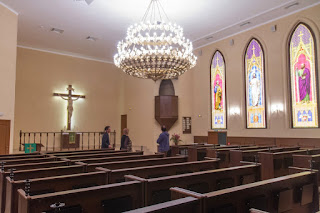Novosibirsk
Photographs and documents, household items and clothing, hand-written hymn collections and antique Bibles – the exhibition “Lutherans: Three Centuries in Siberia” brought all of this and more together for visitors in Novosibirsk and Tomsk this winter. A lot of work in the state and personal archives led to a large amount of interesting historical material being gathered together that help tell the story of our church.
On January 22 the exhibition opened in the Novosibirsk Russian-German house. There visitors could learn about the three stages of the spread of Lutheranism in Siberia – first, through the resettlement of ethnic Germans and others to Siberia during the imperial period, then through the repressions and exile of the Soviet period (including the confiscation of church property, the murder of pastors and the closing of congregations). It was this second period, despite all the trials, that saw real growth in the church, especially thanks to those who came from the Volga region. The third period, beginning in the 1970s, started when the repressions of the church began to wane. Small groups of believers who met in private homes began to receive the right to form congregations and to openly preach the Word of God. The exhibit showed the history of congregations in Tobolosk, Tomsk, Omsk, Barnaul, the Krasnoyarsk region, Irkutsk and other places.
The opening of the exhibition was attended by many guests, including representatives from the Russian-German house and the city and state administration, the German Consul Vitkor Richter, Bishop Joseph Werth from the Roman Catholic Church. ELCUSFE Church Administrator Tatyana Muramtseva (who led our church's delegation); pastors and congregational members from Omsk and Novosibirsk greeted those in attendance. The Gute Laune ensemble provided musical accompaniment, and a short film on the history of Lutheran was shown, followed by a reception.
As Tatyana Muramtseva noted, the Church has two tasks – to spread the Gospel and to serve people. We hope that these exhibitions will be useful for understanding the rich experience of our brothers and sisters in faith and will inspire those who attend not only to get acquainted with the Lutheran church, but also with the One who stands at the center of the Church, Jesus Christ.
Photographs and documents, household items and clothing, hand-written hymn collections and antique Bibles – the exhibition “Lutherans: Three Centuries in Siberia” brought all of this and more together for visitors in Novosibirsk and Tomsk this winter. A lot of work in the state and personal archives led to a large amount of interesting historical material being gathered together that help tell the story of our church.
On January 22 the exhibition opened in the Novosibirsk Russian-German house. There visitors could learn about the three stages of the spread of Lutheranism in Siberia – first, through the resettlement of ethnic Germans and others to Siberia during the imperial period, then through the repressions and exile of the Soviet period (including the confiscation of church property, the murder of pastors and the closing of congregations). It was this second period, despite all the trials, that saw real growth in the church, especially thanks to those who came from the Volga region. The third period, beginning in the 1970s, started when the repressions of the church began to wane. Small groups of believers who met in private homes began to receive the right to form congregations and to openly preach the Word of God. The exhibit showed the history of congregations in Tobolosk, Tomsk, Omsk, Barnaul, the Krasnoyarsk region, Irkutsk and other places.
The opening of the exhibition was attended by many guests, including representatives from the Russian-German house and the city and state administration, the German Consul Vitkor Richter, Bishop Joseph Werth from the Roman Catholic Church. ELCUSFE Church Administrator Tatyana Muramtseva (who led our church's delegation); pastors and congregational members from Omsk and Novosibirsk greeted those in attendance. The Gute Laune ensemble provided musical accompaniment, and a short film on the history of Lutheran was shown, followed by a reception.
As Tatyana Muramtseva noted, the Church has two tasks – to spread the Gospel and to serve people. We hope that these exhibitions will be useful for understanding the rich experience of our brothers and sisters in faith and will inspire those who attend not only to get acquainted with the Lutheran church, but also with the One who stands at the center of the Church, Jesus Christ.






























